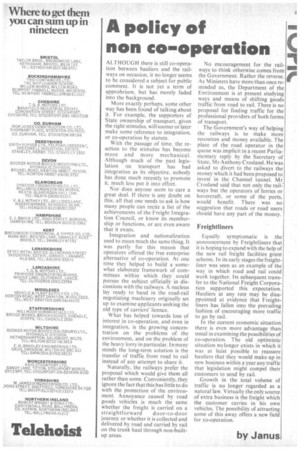A policy of non co-operation
Page 27

If you've noticed an error in this article please click here to report it so we can fix it.
ALTHOUGH there is still co-operatidn between hauliers and the railways on occasion, it no longer seems to be considered a subject for public comment. It is not yet a term of approbrium, but has merely faded into the background.
More exactly perhaps, some other way has been found of talking about it. For example, the supporters of State ownership of transport, given the right stimulus, will sooner or later make some reference to integration, or co-operation by statute.
With the passage of time, the reaction to the stimulus has become more and more mechanical. Although much of the past legislation on transport has had integration as its objective, nobody has done much recently to promote it, much less put it into effect.
Nor does anyone seem to care a great deal. If there is any doubt on this, all that one needs to ask is how many people can recite a list of the achievements of the Freight Integration Council, or know its membership or functions, or are even aware that it exists.
Integration and nationalization used to mean much the same thing. It was partly for this reason that operators offered the free enterprise alternative of co-operation. At one time they helped to build a somewhat elaborate framework of committees within which they could pursue the subject officially in discussions with the railways. A nucleus lay ready to hand in the road-rail negotiating machinery originally set up to examine applicants seeking the old type of carriers' licence.
What has helped towards loss of interest in co-operation, and even in integration, is the growing concentration on the problems of the environment, and on the problem of the heavy lorry in particular. In many minds the long-term solution is the transfer of traffic from road to rail instead of any attempt to share it.
Naturally, the railways prefer the proposal which would give them all rather than some. Conveniently, they 'ignore the fact that this has little to do with the protection of the environment. Annoyance caused by road goods vehicles is much the same whether the freight is carried on a straightforward door-to-door journey or whether it is collected and delivered by road and carried by rail on the trunk haul through non-builtup areas. No encouragement for the railways to think otherwise comes from the Government. Rather the reverse. As Ministers have more than once reminded us, the Department of the Environment is at present studying ways and means of shifting goods traffic from road to rail There is no proposal for finding traffic for the professional providers of both forms of transport.
The Government's way of helping the railways is to make more resources and money available. The place of the road operator in the queue was implicit in a recent Parliamentary reply by the Secretary of State, M r Anthony Crosland. He was asked to divert to the railways the money which it had been proposed to invest in the Channel tunnel. Mr, Crosland said that not only the railways but the operators of ferries or hovercraft, or some of the ports, would benefit. There was no suggestion that roads or road users should have any part of the money.
Freightliners
Equally symptomatic is the announcement by Freightliners that it is hoping to expand with the help of the new rail freight facilities grant scheme. In its early stages the freightliner was seen as an example of the way in which road and rail could work together. Its subsequent transfer to the National Freight Corporation supported this expectation. Hauliers at any rate may be disappointed at evidence that Freightliners has fallen into the prevailing fashion of encouraging more traffic to go by rail.
In the current economic situation there is even more advantage than usual in examining the possibilities of co-operation. The old optimistic situation no longer exists in which it was at least possible to reassure hauliers that they would make up in new business within a year any traffic that legislation might compel their customers to send by rail.
Growth in the total volume of traffic is no longer regarded as a natural law. Virtually the only source of extra business is the freight which. the customer carries in his own vehicles. The possibility of attracting some of this away offers a new field for co-operation.








































































































